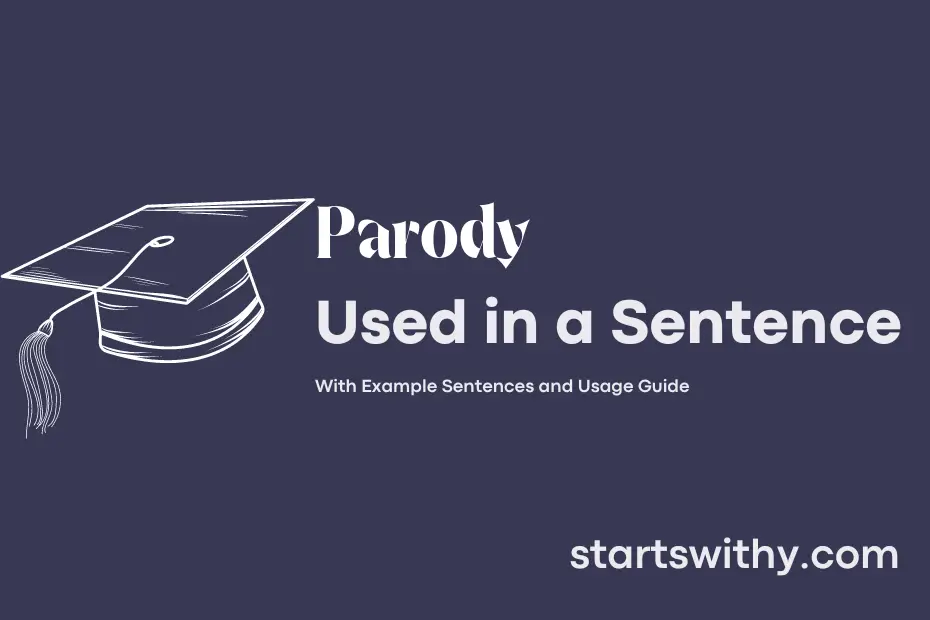Have you ever come across a hilarious imitation or a clever mockery of a famous work? That, my friend, is what we call a parody. A parody is essentially a comedic imitation of a person, a literary work, or a genre, designed to poke fun at the original and entertain audiences.
Parodies often play with familiar themes, characters, or styles, creating a satirical twist that can end up being downright hilarious. Whether it’s a playful take on a blockbuster movie, a reinterpretation of a classic novel, or a humorous spin on a popular song, parodies have a way of adding humor and creativity to our daily entertainment.
7 Examples Of Parody Used In a Sentence For Kids
- The parody we watched was funny.
- My brother likes to make parodies of songs.
- We laughed a lot at the parody of the movie.
- The comedian did a great parody of a famous actor.
- Let’s create a parody of our favorite story.
- The parody made us all giggle.
- Have you seen a parody before?
14 Sentences with Parody Examples
- The college drama society put on a hilarious parody of a popular Bollywood movie.
- The political science students created a satirical parody video about the Indian government.
- The English literature class analyzed a parody of a famous Shakespearean play.
- The engineering students made a parody of a TED talk for their project presentation.
- The marketing students wrote a social media parody advertisement to highlight consumer behavior.
- The medical students performed a parody skit about different specialties in the healthcare field.
- The computer science students developed a video game parody of a classic arcade game.
- The architecture students designed a parody building that combined elements of different architectural styles.
- The fashion design students created a parody fashion show featuring exaggerated and unconventional designs.
- The business students presented a parody of a corporate board meeting to demonstrate leadership and communication skills.
- The history students made a parody timeline of significant events in India’s independence movement.
- The psychology students staged a parody therapy session to explore different counseling techniques.
- The environmental science students filmed a parody documentary about climate change and conservation efforts.
- The economics students wrote a parody research paper on the impact of demonetization on the Indian economy.
How To Use Parody in Sentences?
To use the word parody in a sentence, it is important to understand its meaning and how it is typically used. A parody is a humorous or exaggerated imitation of a person, literary work, movie, or other form of art that aims to mock or critique the original.
When incorporating parody into a sentence, consider using it to describe a work of art or a humorous imitation. For example, “The comedian performed a brilliant parody of the popular TV show, leaving the audience in stitches.” In this sentence, parody is used to describe the comedic imitation of the TV show.
Remember to use parody in a context that highlights its humorous or satirical nature. You can also use it to describe something that is cleverly imitating or making fun of something else. For instance, “The viral video was a hilarious parody of a famous music video, racking up millions of views online.”
Overall, when using the word parody in a sentence, aim to capture the essence of humor, imitation, or satire that is characteristic of a parody. By understanding its meaning and how it is commonly used, you can effectively incorporate it into your writing or conversations.
Conclusion
In conclusion, parody is a form of humor or satire that imitates or exaggerates the style of a particular work, artist, or genre for comedic effect. It often involves using well-known elements in a humorous or exaggerated way to poke fun at the original piece. For example, “The parody of a popular song had the audience in stitches with its cleverly altered lyrics and exaggerated performance.”
Overall, parody serves as a tool for entertainment, commentary, and cultural criticism, offering a light-hearted or satirical take on familiar themes. Whether in literature, music, film, or other forms of media, parody can provide a comedic and often thought-provoking perspective on the world around us by cleverly mimicking and exaggerating elements of popular culture.



